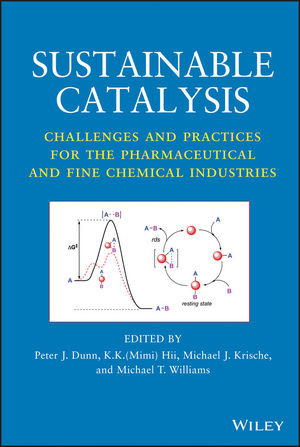

Most ebook files are in PDF format, so you can easily read them using various software such as Foxit Reader or directly on the Google Chrome browser.
Some ebook files are released by publishers in other formats such as .awz, .mobi, .epub, .fb2, etc. You may need to install specific software to read these formats on mobile/PC, such as Calibre.
Please read the tutorial at this link: https://ebookbell.com/faq
We offer FREE conversion to the popular formats you request; however, this may take some time. Therefore, right after payment, please email us, and we will try to provide the service as quickly as possible.
For some exceptional file formats or broken links (if any), please refrain from opening any disputes. Instead, email us first, and we will try to assist within a maximum of 6 hours.
EbookBell Team

0.0
0 reviewsOpens the door to the sustainable production of pharmaceuticals and fine chemicals
Driven by both public demand and government regulations, pharmaceutical and fine chemical manufacturers are increasingly seeking to replace stoichiometric reagents used in synthetic transformations with catalytic routes in order to develop greener, safer, and more cost-effective chemical processes. This book supports the discovery, development, and implementation of new catalytic methodologies on a process scale, opening the door to the sustainable production of pharmaceuticals and fine chemicals.
Pairing contributions from leading academic and industrial researchers, Sustainable Catalysis focuses on key areas that are particularly important for the fine chemical and pharmaceutical industries, including chemo-, bio-, and organo-catalytic approaches to C?H, C?N, and C?C bond-forming reactions. Chapters include academic overviews of current innovations and industrial case studies at the process scale, providing new insights into green catalytic methodologies from proof-of-concept to their applications in the synthesis of target organic molecules.
Sustainable Catalysis provides the foundation needed to develop sustainable green synthetic procedures, with coverage of such emerging topics as:
Offering a balanced perspective on current limitations, challenges, and solutions, Sustainable Catalysis is recommended for synthetic organic chemists seeking to develop new methodologies and for industrial chemists dedicated to large-scale process development.Content:
Chapter 1 Catalytic Reduction of Amides Avoiding LiAlH4 OR B2H6 (pages 1–36): Deborah L. Dodds and David J. Cole?Hamilton
Chapter 2 Hydrogenation of Esters (pages 37–61): Lionel A. Saudan
Chapter 3 Synthesis of Chiral Amines Using Transaminases (pages 63–74): Nicholas J. Turner and Matthew D. Truppo
Chapter 3 Development of A Sitagliptin Transaminase (pages 75–87): Jacob M. Janey
Chapter 5 Direct Amide Formation Avoiding Poor Atom Economy Reagents (pages 89–110): Benjamin M. Monks and Andrew Whiting
Chapter 6 Industrial Applications of Boric Acid And Boronic Acid?Catalyzed Direct Amidation Reactions (pages 111–120): Joanne E. Anderson, Jannine Cobb, Roman Davis, Peter J. Dunn, Russ N. Fitzgerald and Alan J. Pettman
Chapter 7 OH Activation for Nucleophilic Substitution (pages 121–137): Jonathan M.J. Williams
Chapter 8 Application of A Redox?Neutral Alcohol Amination in The Kilogram?Scale Synthesis of A GlyT1 Inhibitor (pages 139–162): Martin A. Berliner
Chapter 9 Olefin Metathesis: From Academic Concepts to Commercial Catalysts (pages 163–214): Justyna Czaban, Christian Torborg and Karol Grela
Chapter 10 Challenge and Opportunity in Scaling?Up Metathesis Reaction: Synthesis of Ciluprevir (BILN 2061) (pages 215–232): Nathan Yee, Xudong Wei and Chris Senanayake
Chapter 11 C?H Activation of Heteroaromatics (pages 233–267): Koji Hirano and Masahiro Miura
Chapter 12 The Discovery of A New Pd/Cu Catalytic System For C?H Arylation and Its Applications in A Pharmaceutical Process (pages 269–285): Jinkun Huang, Xiang Wang and Johann Chan
Chapter 13 Diarylprolinol Silyl Ethers: Development and Application As Organocatalysts (pages 287–316): Hiroaki Gotoh and Yujiro Hayashi
Chapter 14 Organocatalysis for Asymmetric Synthesis: From Lab To Factory (pages 317–337): Feng Xu
Chapter 15 Catalytic Variants of Phosphine Oxide?Mediated Organic Transformations (pages 339–361): Stephen P. Marsden
Chapter 16 Formation of C?C BONDS via Catalytic Hydrogenation and Transfer Hydrogenation (pages 363–408): Joseph Moran and Michael J. Krische